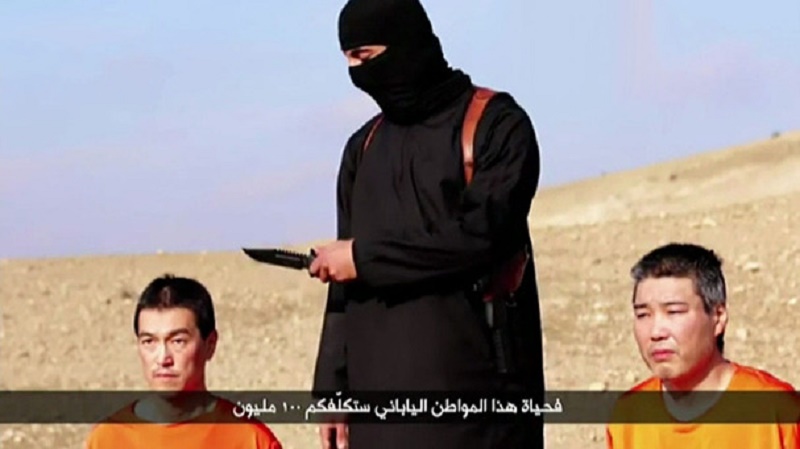
As the 72 hour deadline set for Japanese officials to respond to Islamic State's demand for $200 million ransom nears its end, the government revealed it has tried and failed to make contact with the militant group.
On Tuesday, ISIS demanded the large ransom, equivalent to the amount the Japanese government had pledged in non-lethal aid to countries battling ISIS, in exchange for the lives of journalist and devout Christian Kenji Goto and military contractor Haruna Yukawa.
If the Japanese government fails to pay the sum, the two hostages will likely meet the same grim fate as several Western hostages have in the past months.
Following the video's release, Japan's Prime Minister, Shinzo Abe, called an emergency cabinet meeting in which he vowed to do everything in his power to ensure the hostages returned home safely.
"This is a race against time, but the government will do everything it can," Mr. Abe told reporters, but emphasized that his country will not take back the money it pledged in foreign aid.
But on Thursday, with less than 20 hours to go, the Japanese government admitted it had still not spoken to the Islamic State group.
"We have not been able to confirm their safety," Chief Cabinet Secretary Yoshihide Suga told reporters in a press conference. He added that the militant group's demands stemmed from a "misunderstanding," as the promised aid money was specifically allocated for humanitarian, and not military, purposes.
"They are totally wrong about our position," Mr. Suga told journalists.
"We wish not to fight against the world of Islam, we want to help the more than ten million refugees in the region. This is humanitarian and non-military support. We want them to understand this, and free the hostages immediately."
While Mr. Suga was vague regarding whether or not Japan would pay the ransom, he insisted the country "will not give in to terror, and will contribute to the international community's efforts to deal with terror."
Some have speculated that IS intentionally made the unrealistic monetary demand of $200 million simply to make headlines and instill fear in countries opposing its forces.
"They kept (hostages Haruna) Yukawa and (Kenji) Goto locked up . . . waiting for Japan to announce their role in the fight against ISIS. They then issued a video on very short notice asking for more money than any government would be willing to pay," James Simpson, a Tokyo-based defense analyst, told The Japan Times.
"They win either way: Either Japan pays up and ISIS hits the jackpot, or they kill the hostages and spread their message of fear and terror to a new target," he said.
However, according to the New York Times, the Japanese government was aware of the hostage situation prior to the video's release, but failed to take the necessary measures to ensure their freedom. In November, Mr. Goto's wife was first contacted by the Islamic State in an email saying the militants were holding her husband.
Although the emails did not demand a ransom until January, when she was asked to pay about $20 million, she had consulted with the Ministry of Foreign Affairs on two separate occasions. The first time was in October, when her husband disappeared, and again after receiving the first ransom demand.
"If the investigating authorities failed to build a channel to the kidnappers over the last five months, what can they do in three days?" said Kosuke Tsuneoka, a freelance journalist with experience in war zones who was himself held by the Taliban in Afghanistan, told the Times. "I think the situation now is bleak."
On social media, the hostage situation garnered a mixed reaction from the Japanese public, many of whom criticized Goto and Yukawa for entering the Middle East while fully aware of the danger they could face.
"Neither Mr. Goto nor Mr. Yukawa went to Syria upon request from the Japanese government," Atsushi Watanabe, a former Diet member from the Liberal Democratic Party, posted on Twitter.
"Maybe I'm heartless, but we cannot give in to the Islamic State group's terrorist acts," he continued, echoing the government's declaration that it would not support terrorism.
Fifi, an Egyptian personality popular with Japanese TV viewers, hinted that Yukawa and Goto had acted irresponsibly by traveling to the Middle East.
"They needed to know the possible results before going to that region, especially now," she wrote. "They're responsible."
Others, however, took on a more charitable tone toward the hostages, showing particular sympathy for Goto, an experienced war reporter whose work has sought to highlight the plight of children in conflict zones.
"We pray that Kenji Goto can safely return to Japan. He feels sympathy for the unfortunate children and people in oppressed countries," tweeted Japanese Theatre Critic Ayano Tanaka.
As of Thursday morning, a Change.org petition encouraging the Abe administration to "suspend the aid immediately to facilitate the rescue of the two hostages" and calling for ISIS terrorism to be "denounced unconditionally" had garnered 16,000 signatures.
"The government will not be blameless if it fails to take all necessary measures for the rescue and the prevention of the worst-case scenarios," the petition's description reads. "Japan's humanitarian aids in the region must be strictly designed to prevent any further entanglement of our nation in this new "war".
While IS group has previously killed three Americans and two Britons, this is the first time Japanese citizens have been threatened, and the first time a ransom demand has been made.


















